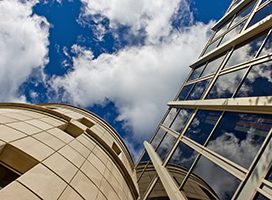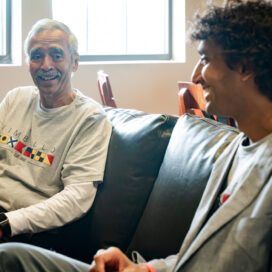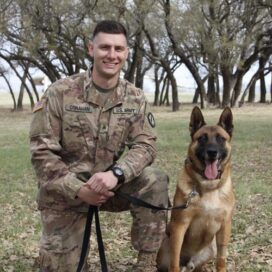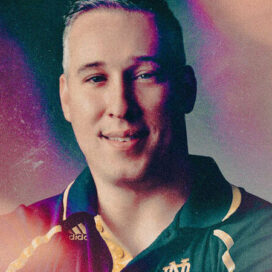More than NIL
Mendoza grads created an online marketplace to connect athletes and businesses
Published: June 3, 2022 / Author: Brendan O’Shaughnessy
The idea was born when Ayden Syal (BBA ‘17) saw California’s governor permit college athletes to monetize their name, image and likeness (NIL) and change the balance of power in college sports. He drew up a 15-page business plan that night.
But the true moment of origin came in early 2020 when Syal called Brandon Wimbush (BBA ‘19), his friend from north Jersey and fellow Mendoza College of Business alum, for perspective on how to build his vision.
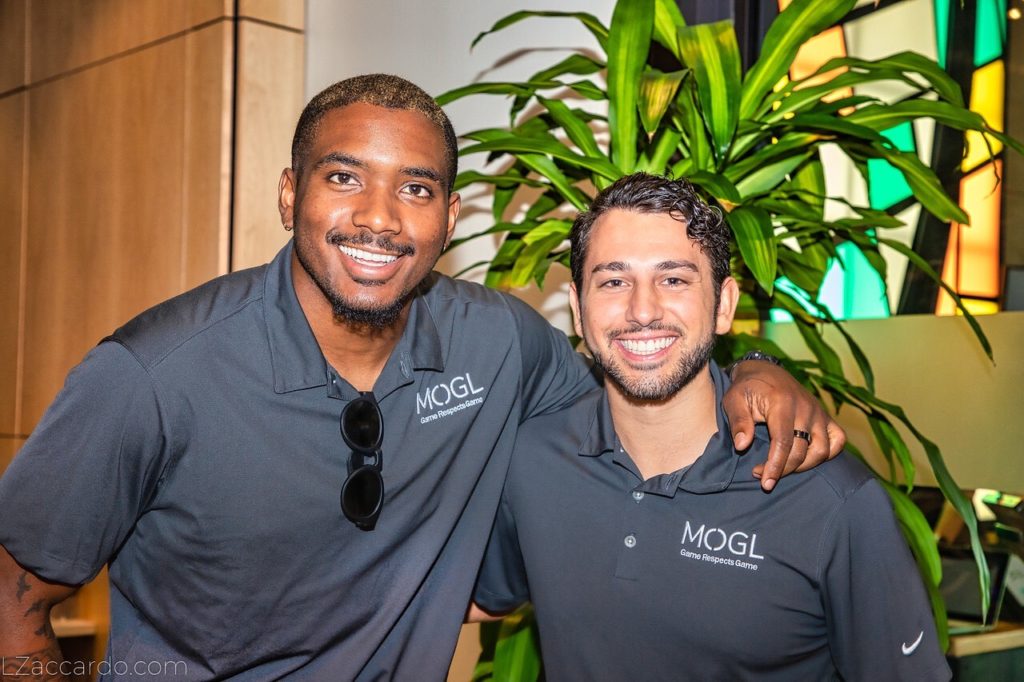
Brandon Wimbush (BBA ‘19) and Ayden Syal (BBA ‘17)
“I was one of the athletes he reached out to,” said Wimbush, a former four-star quarterback recruit and the 2017 starter at the University of Notre Dame. “I was training at House of Athlete and it was kind of on the lower end of whether or not I was going to get a shot at the NFL. And I picked up the phone and said I’d offer you something even better and hopefully join the team.”
Combining business and athletic experience, Syal and Wimbush decided to co-found an online platform called MOGL to connect collegiate athletes with businesses and brands. The platform operates as a matchmaker similar to LinkedIn, allowing athletes to share their interests and skills and businesses to list their campaigns and marketing opportunities. A local pizza shop, for instance, can filter marketing options, invite athletes in their area and receive applicants.
Syal and Wimbush got a jumpstart on creating the technology before NIL went into effect nationally in summer 2021 and before the NCAA attempted to impose any regulations on what would become a feeding frenzy of companies eager to capitalize on the trend.
Still, the co-founders believe their product stands out in a quickly crowding field because they focus on empowering the athletes.
“We were definitely skating to where the puck was going,” Syal said. “This was built truly to coach athletes and to help businesses and brands reach new audiences with a targeted strategy at an affordable and scalable rate.”
The founders said they are currently connecting nearly 3,000 athletes with about 900 brands, including Allbirds shoes, DoorDash, Applebees and Pure Barre fitness studios. Unlike the traditional agent model, which takes a percentage of the athletes’ advertising earnings, MOGL charges the companies a 20% fee. Athletes can pursue NIL opportunities for free.
If it flourishes, MOGL wouldn’t be the first online platform to put pressure on a traditional business model. And while sports agents woo the superstars and their high-dollar contracts, Syal and Wimbush said they are focusing on education, compliance and a marketplace that can match any level of influencer with the right brand. Most deals don’t warrant agent representation, so MOGL aims to fill that space in the market.
For example, TicketSmarter is an online ticket resale market like StubHub or VividSeats. Syal said the company did a national activation, using more than 200 athletes to promote their respective sport, school or geographic location — an example of the scalability the platform offers.
“MOGL is a disrupter,” Syal said. “What we’re doing is truly providing athletes with an alternative mechanism to source deals and monetize their NIL without having to sign a traditional agent representation contract.”
It’s a wild NIL world
The eyebrows of the college football world collectively raised in March when five-star quarterback recruit Nico Iamaleava reportedly signed a NIL contract worth up to $8 million dollars weeks before signing with the University of Tennessee. Questions about pay-for-play were asked.
But those eyes went positively buggy when Jordan Addison, last year’s Biletnikoff Award winner as the nation’s top receiver at Pitt, decided to enter the transfer portal — taking advantage of the NCAA decision to allow transfers to play immediately amidst rumors of a huge NIL payday in Los Angeles. Several coaches bemoaned what appeared to be a lawless free-agent market and the swift collapse of the amateurism façade.
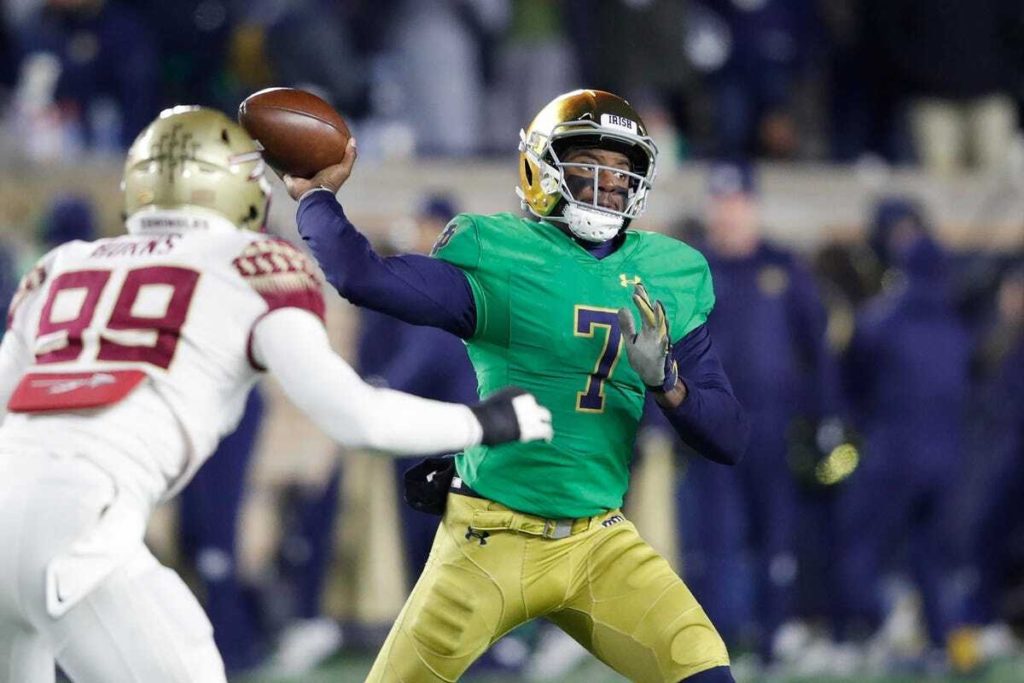 “I don’t think what we’re doing right now is a sustainable model,” said Nick Saban, the iconic Alabama football coach, to the Associated Press. “That creates a situation where you can basically buy players.”
“I don’t think what we’re doing right now is a sustainable model,” said Nick Saban, the iconic Alabama football coach, to the Associated Press. “That creates a situation where you can basically buy players.”
Some pundits scoffed at school-hopping, millionaire coaches whining that players finally got a piece of the pie. Many wondered how we got to this point. Short answer: through a lack of foresight.
Lawsuits forcing the legal status of name, image and likeness rights have been working through the courts for years. Back in 2015, Notre Dame President Rev. John I. Jenkins, C.S.C., said he didn’t want colleges to pay players but supported the rights of athletes to make money from commercial uses of NIL.
Still, the NCAA didn’t act until differing state laws over NIL rights threatened a mishmash of rules and forced the toothless institution to put in place an interim policy in July 2021. These rules include a ban on direct payments from universities to players, but they haven’t seemed to stop collectives of boosters from taking on that role.
Football and basketball players (male and female) earned more than 80 percent of the endorsement money in the first 10 months of the NIL era, according to the sports marketing firm Opendorse, which also operates the largest NIL platform. Still, athletes from other sports have cashed in, too, if they have a strong social media base. Opendorse reports that Division 1 athletes averaged $664 from NIL deals, mostly for posting content online.
Significant issues have yet to be worked out. Ole Miss Coach Lane Kiffin wondered how a booster would react when a huge investment sits on the bench, as well as how money will affect locker room cohesion. While some think the NIL market will naturally correct itself, others see these payouts as more passion purchases than rational investments. Parity is not a likely outcome in this all-out arms race.
On the positive side, some athletes — such as Kentucky basketball star Oscar Tshiebwe — have chosen to stay in college because they can make as much money as a rookie pro contract.
On May 9, the NCAA issued new guidance aimed at preventing collectives of boosters from using NIL promises in player recruitment. How effective the new rules will be is at best uncertain.
Wimbush admitted to conflicting feelings about the new era. On one hand, he could have cashed in if he was born a little later. Still, he said he’s excited to be working in a space that allows today’s athletes to realize their value. And he believes that clear regulations will help MOGL.
“Right now, it’s rough — a Wild West with this negative connotation around it,” Wimbush said. “But compliance for us is a solution to build a level of trust with our athletes and the universities. We allow the universities to have insight into our platform — which brands the athletes are engaging with, how much money they’re making. So inevitably, they’re going to trust our platform and push their athletes to our platform.”
Building a concept
The initial inspiration for the business, Syal said, came from watching California Governor Gavin Newsom appear on an HBO reality show to sign a state NIL law that would begin in 2023. Syal said MOGL is not an acronym, but a variation of the college athlete as a business mogul.
“At the time, I was working in private equity,” Syal said. “I wasn’t passionate about what I was doing on a daily basis and didn’t feel like I was truly making a difference in the lives of others. I recognized that both athletes and brands would need a safe and secure and compliant medium to connect to opportunities and to connect for branding and endorsement opportunities.”
He called Wimbush, who went to a rival high school in New Jersey and came to Notre Dame after him. Syal studied management consulting and Wimbush studied accounting at Mendoza. Syal said bringing Wimbush on board was “an absolute game changer.”
“He brings the unique ability to empathize with the collegiate athlete experience,” Syal said. “Having Brandon on the team not only allows us to work more closely with athletes, but also puts athletes at the forefront of everything we do.”
Syal said one of the Mendoza mentors he has kept in touch with is management teaching professor Wendy Angst, who teaches classes in design thinking, innovation and entrepreneurship. Angst said she encouraged them to test early iterations of the platform before building out the final product.
“I talked with them in the early stage of their concept,” Angst said. “The focus was around being mindful of all stakeholders in the process and considering how their concept could add value to each of them.”
Following that advice, Syal and Wimbush said MOGL’s focus on educational resources and youth sports philanthropy are two elements that help them differentiate their company.
“We’re giving the athletes educational resources and curriculum across financial literacy, tax, content creation, brand building, NFT’s, merchandising, contractor view — completely for free,” Syal said. “Nobody else in the NIL space is providing this level of service and care to the athletes.”
Wimbush said MOGL’s support for local youth athletics is important to him personally. The company has partnered with Every Kid Sport, which aims to help 100,000 kids from low-income families play youth sports, which can be a financial challenge.
“I’m not who I am today without youth sports and without the people who helped me get through those,” Wimbush said. “I grew up in a single-parent home and so my mom needed that help and support.”
Taking off
An early boost in building MOGL came in May 2021 when the company won two prizes in the Notre Dame McCloskey New Venture Competition: the opportunity to pitch at the IrishAngels Investor Meeting and the $5,000 Wray/O’Brien Award for best minority-led venture.
“The McCloskey competition was especially exciting for Brandon and I,” Syal said. “Because, A, it was the first pitch competition that we partook in and, B, we both went to Notre Dame. We have incredibly strong ties to the school.”
The recognition was more significant than the funding. Syal said MOGL raised more than $2 million in a pre-seed round in 2021 and is currently fundraising for a seed round. He said even more momentum was built by winning the Social and Culture category at the South by Southwest (SXSW) pitch competition in March, which includes more than 6,000 applicants.
“It really signaled to the world how massive an opportunity this is, and how differentiated our approach is,” Syal said. “This is the largest pitch competition in the U.S., if not the world, and we were able to win as a name, image and likeness marketplace less than a year after name, image and likeness went into effect and became legal.”
Another strategy MOGL has used to grow is through partnering with other companies that offer athletes related opportunities in the new NIL landscape — and especially with businesses that also have Notre Dame connections.
Fresh off their SXSW victory, MOGL hosted an NFT event in Austin with Simba Chain. Every attending athlete was given their own NFT (non-fungible token) through live minting technology provided by Simba Chain, a development platform for companies to build decentralized apps on any blockchain. A similar NFT event around Notre Dame’s spring Blue-Gold Game raised $300,000 to be split among all 100 players on the roster.
MOGL connected with Simba Chain through the Notre Dame IDEA Center, which incubated Simba Chain and runs the McCloskey competition.
“The Notre Dame network obviously breeds incredibly successful, driven and intelligent people,” Syal said. “The Notre Dame background, diploma, degree — it adds that additional trust factor for us.”
Similarly, MOGL partnered with Vintage Brand, a digital sports apparel and merchandise company, to offer a first-of-its-kind NIL network for all 500,000 NCAA college athletes to become paid endorsers of Vintage Brand. Chad Hartvigson, the co-founder and CEO of Vintage, is another Mendoza alum and former Notre Dame baseball player from the early 1990s.
Hartvigson said the two companies share a mission to educate and empower athletes in order to “change the traditional athlete endorsement game.”
“We want to open the doors to educational opportunities outside of just unlocking monetary rewards,” Hartvigson said. “We want to help them grow as student-athletes, experience an entrepreneurial path and set them up for a future beyond college sports.”
Bright future
Wimbush said the company started with connections at Notre Dame and has expanded quickly, making inroads at Texas, UCLA, Ohio State, Michigan, North Carolina and Georgia. More than half of MOGL’s athlete participants are female.
One success story is Detroit-Mercy’s Maddie Johnson, the first black female lacrosse player to sign a NIL deal. More high-profile deals include UCLA quarterback Chase Griffin and UNC basketball player Puff Johnson, both endorsing men’s grooming brand Scotch Porter.
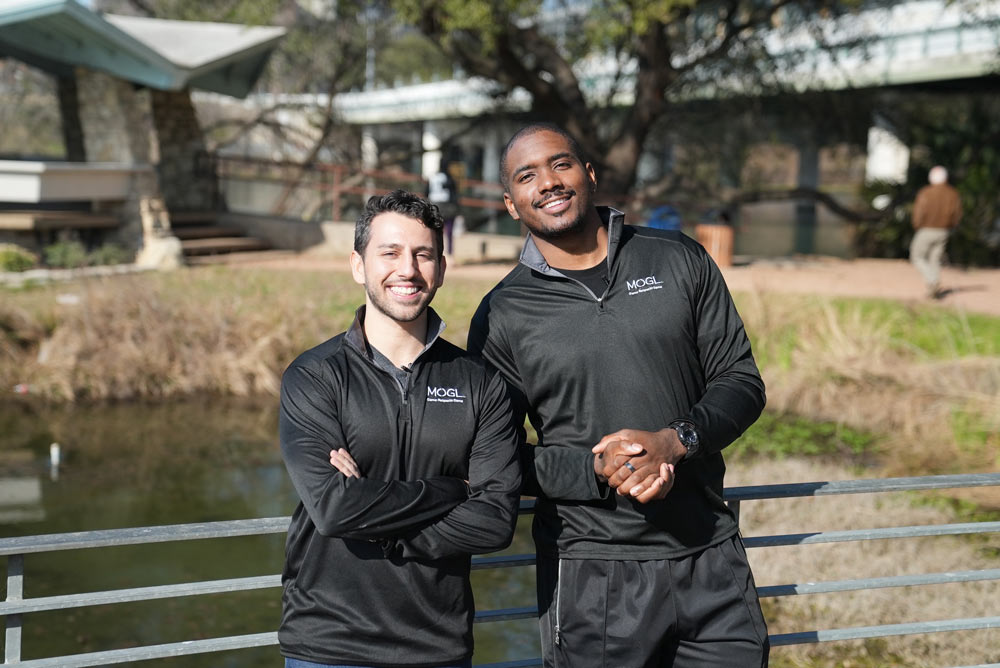
Brandon Wimbush (BBA ‘19) and Ayden Syal (BBA ‘17)
Syal said he hopes to sign more national franchises like Buffalo Wild Wings, which could tailor local market campaigns by connecting with nearby athletes. Wimbush said that while the company is focused on college athletes, it could also provide opportunities for pros who aren’t the big stars.
“Our platform ideally is used for any type of influencer,” Wimbush said “The seniors right now in college, they’re going to grow into being professional athletes.”
MOGL currently has 11 employees primarily across sales and marketing. The company recently hired a former athletic director to manage their university relations and compliance process.
There is plenty of competition for the big names in sports, including at Notre Dame. The Irish Players Club, started by two former football players, was the group that minted NFT’s for the Blue-Gold Game. Friends of the University of Notre Dame (FUND) is a booster collective started by former star Brady Quinn that hopes to provide stipends for charitable work.
But Wimbush and Syal are confident that they can partner with these fledgling groups by offering the advanced tech platform they will need to connect athletes and opportunities.
“The number one reason why MOGL will succeed in this broader landscape,” Syal said, “is that the user experience on the platform is far superior to anything else that exists on the market today.”
Related Stories
